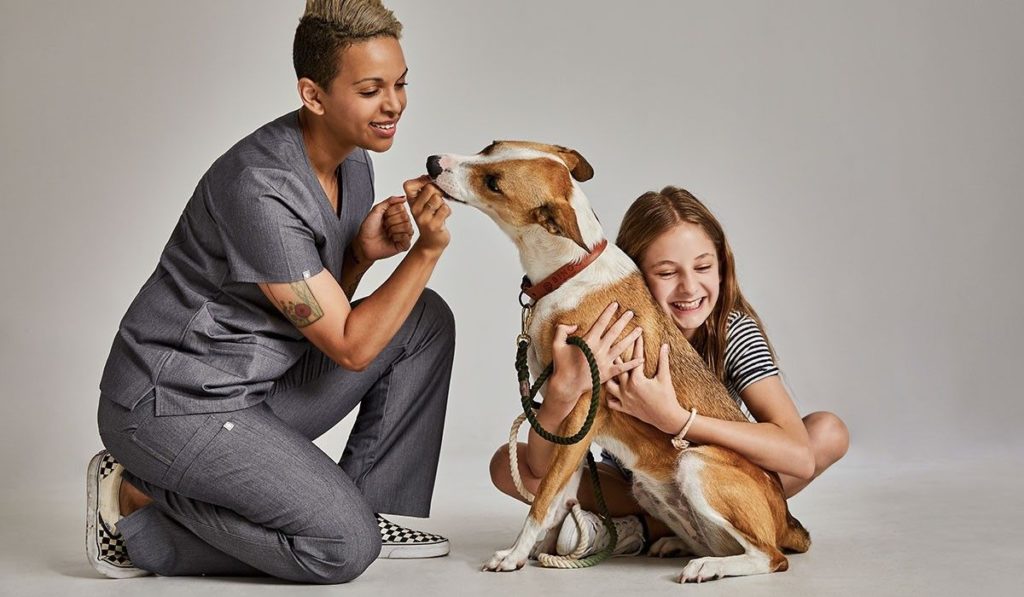Canine Vaccines: Protecting your Pet
Vaccinations for your Dog

Understanding vaccinations can be tough. Here’s a guide to the two groups of canine vaccines.
CORE VACCINES:
DAPP is a combination vaccine which is started at 6-8 weeks old and boosted every 3 to 4 weeks until your puppy is at least 16 weeks old. The puppy series lasts for one year, then we will boost this vaccine every 3 years during the life of your dog. DAPP stands for the following diseases:
- Distemper is a virus attacks mucous membranes. It usually starts in the respiratory tract and leads to pneumonia. It spreads to the central nervous system causing seizures, tremors, limb weakness, and can be deadly.
- Adenovirus causes respiratory disease in dogs, and is a potential cause of kennel cough syndrome (canine infectious respiratory disease).
- Parvovirus is commonly found in soil and other organic material in the environment and is famously hardy. This virus is shed in feces and can survive for years, even through the coldest winters. Parvovirus attacks bone marrow and the gastrointestinal tract, leading to severe anemia, inability to fight infection, and severe vomiting and diarrhea. It is deadly.
- Parainfluenza is a highly contagious respiratory virus and is one of the most common pathogens of infectious tracheobronchitis. Signs include: coughing, fever, nasal discharge, lack of energy, and loss of appetite.
RABIES vaccination is required by law. There is no cure for Rabies, and no way to test for the virus on a live animal. Rabies is contracted through a bite wound. The virus penetrates nerves and travels along the nerves to the brain. The rabies virus can take up to 6 months to reach the brain after a bite wound. Because humans are vulnerable to Rabies and it is 100% fatal, there are laws in place ensuring appropriate vaccine, quarantine and testing protocols for both dogs and cats. The first vaccine for your dog or cat lasts one year. Each vaccine thereafter can last up to 3 years depending on the type of vaccine used.
LIFESTYLE VACCINES:
LEPTOSPIROSIS is a bacterial disease that comes from spirochetes shed in the urine of infected mammals, particularly rodents. The bacteria can live in still water, so dogs that drink from puddles or streams are most at risk. Both urban and rural areas can harbor Leptospirosis. There are many serovars, or types, but the vaccine only protects against the four most common serovars that affect dogs. The disease usually causes liver and kidney failure and can be fatal if not treated quickly. Any mammal can be affected, included humans. The vaccine is a series of two, given 3-4 weeks apart, then yearly boosters are required.
LYME DISEASE (Borrelia burgdorferi) is spread through the bite of a tiny, hard-shelled tick known as a deer tick. Lyme disease usually affects the joints, causing lameness and fever, but there is a more serious form that can affect the kidneys. Lyme disease must be transmitted through a tick bite. The vaccine is a series of two, given 2-4 weeks apart, then yearly boosters are required. This vaccine is recommended for dogs at risk of being bitten by ticks, particularly if you visit wooded areas or if your yard has a lot of wildlife.
BORDETELLA bronchiseptica is a bacterium commonly associated with respiratory disease in dogs. This is part of the “kennel cough” syndrome. The classic sign is a cough, often lasting up to two weeks, which is contagious to other dogs and rarely develops into pneumonia. Most boarding kennels and daycares require this vaccine. The most commonly used vaccine is a nose drop which lasts one year, but some boarding kennels require boosters every 6 months.
INFLUENZA in dogs is similar to the flu in humans. The first strain jumped from horses to dogs around 2004, and the second strain jumped from birds to dogs around 2016. Both strains of this virus can cause coughing, sneezing, nasal discharge, lethargy and fever. Dogs can be asymptomatic carriers as well. Influenza is contagious to other dogs by direct contact, or by contact with contaminated objects. The influenza vaccine protects against both strains and is given as a series of two injections 2-4 weeks apart followed by yearly boosters. Some boarding facilities require this vaccine, but it is recommended for all dogs that are boarding or regularly come into contact with other dogs in settings such as daycare or dog parks.
Recent Posts
Can Dogs Eat Ham?
Ham is a popular meat found on many dinner tables, especially during the holidays. As a dog…
8 Signs and Symptoms of Diabetes in Dogs
Caring for a dog means being tuned in to the subtle changes that can reveal their overall…
Why Dogs Can’t Eat Chocolate and Tips for Keeping This Sweet Treat Out of Their Reach
Chocolate is a beloved indulgence for us, but for our dogs, it’s a hidden danger that can…
Why Cat Teeth Cleaning is Important For Your Pet’s Health
As a cat owner, you know how important it is to care for your feline friend’s overall…
Cat Body Language: A Guide To Understand What Your Cat is Telling You
Imagine trying to communicate without words, relying solely on subtle gestures, glances, and movements. This is how…
About Us
Heart + Paw was founded in 2018 by Chief Veterinary Officer Dr. George Melillo, who currently serves the Mid-Atlantic area. Heart + Paw offers a combination of veterinary care, pet grooming, and dog daycare to help be a resource in your pet parenthood journey.
We'd Love to Meet Your Four-Legged Friends
Find out how the friendly veterinary team at your local Heart + Paw can help your pets live longer, healthier lives by searching for a location near you.





